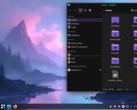March 21, 2025 11:21 PM update
After a handful of bug fixes and additional release candidate testing, Azahar 2120 has been launched as the first official stable release of the Azahar 3DS. Check the GitHub release page for the full change log, but the 2120 full release also adds a new frame buffer that fixes a graphical glitch in Starfox 64 3D.
Original article continues below:
Back when Yuzu, a popular Nintendo Switch emulator, shut down, Citra was soon to follow, seemingly as a result of the legal action Nintendo announced the emulator's developer. Shortly after that, Azahar was announced as a new Nintendo emulator based on the source code of Lime3DS, which is in turn based on Citra, and today, Azahar's developers have announced the first release candidate for the new 3DS emulator.
Azahar's first release candidate is a version of the software that the developers say will serve as a basis for future feature releases. It is being released on Android, Linux, macOS, and Windows for testing, and if no significant issues are found within the first week of testing, it will likely become the first stable release. It can be downloaded from the Azahar GitHub repo.
Something like the Lenovo Legion Go (curr. $602.99 at Amazon) is a great option for 3DS emulation when used in a vertical orientation with the controllers detached.
The release candidate brings a number of interesting features, including a hack called “Disable Right Eye Rendering,” which forces the emulator to render graphics in monoscopic mode — i.e. only one eye — for a potential 50% performance boost. This will likely only be necessary on low-power Android devices, but it's a nice tool to have. Azahar also allows users to directly download games from their Nintendo eShop if 3DS system files are installed.
To avoid getting into the same situation as Citra and Yuzu, Azahar forces users to use an actual Nintendo 3DS to extract game files with a new software tool called Artic. Azahar provides no way to load encrypted games, so game files must first be decrypted before they can be loaded into the system. Part of the reason that encrypted game support was dropped is that circumventing TPM and security measures was a key argument in the lawsuits against Yuzu and Citra.
Azahar does, however, provide cryptographic keys to users, arguing that this is required for interoperability, and that they are “not creative enough to be protected by copyright law.” This makes things easier for end users, since they will not need to extract the keys from their consoles.
Azahar's developers insist that Azahar's goal is not to enable piracy, and much of its messaging emphasises that users should only be using the emulator to make copies of their own original games. There is more about this in a recent Azahar blog post on the topic of game loading.






















